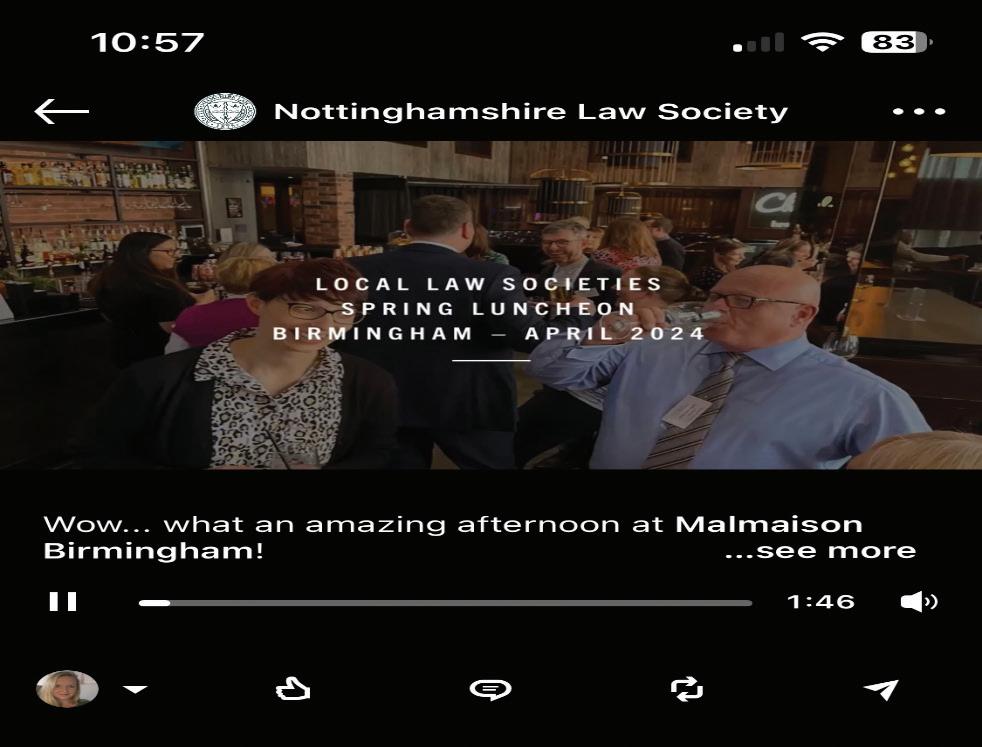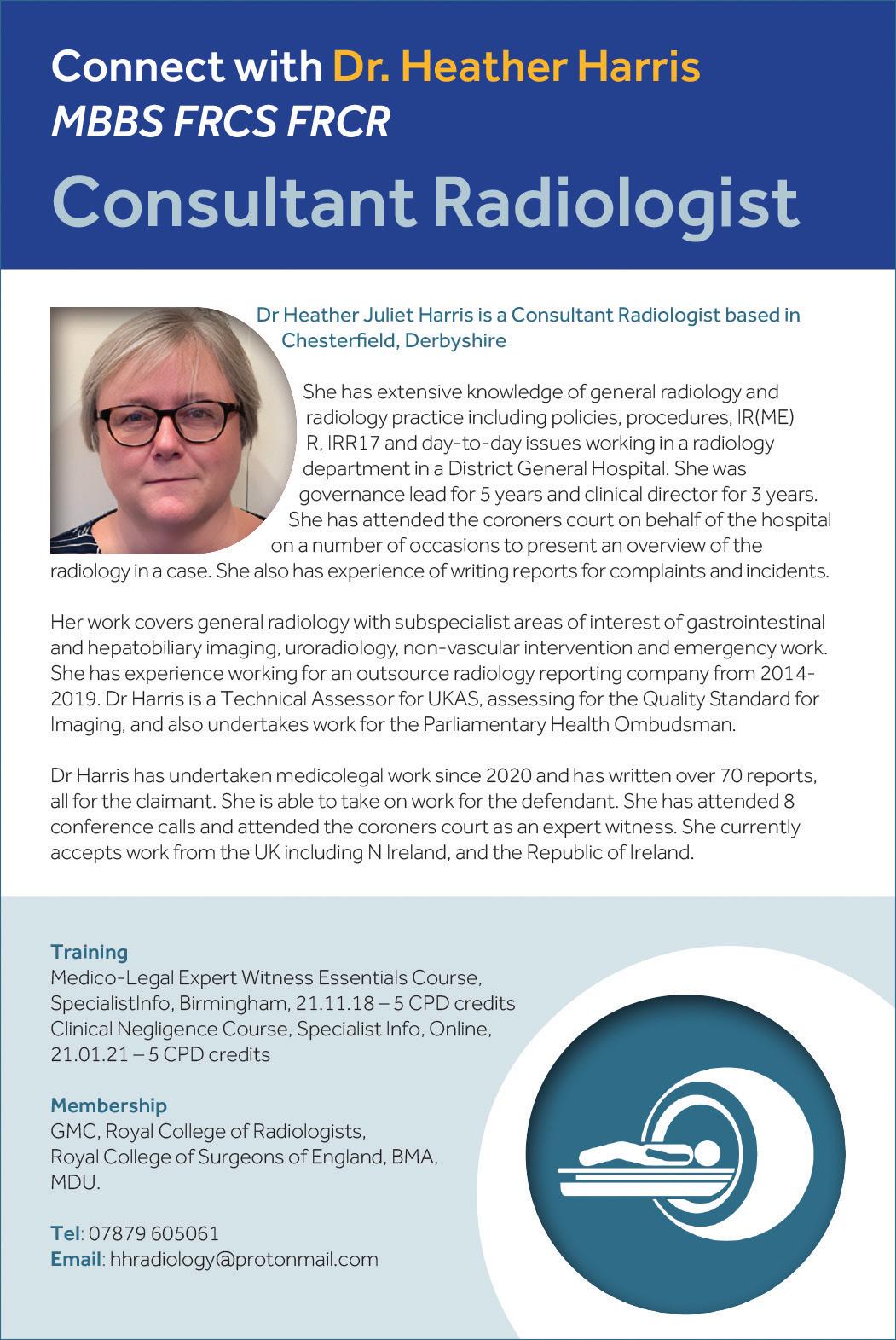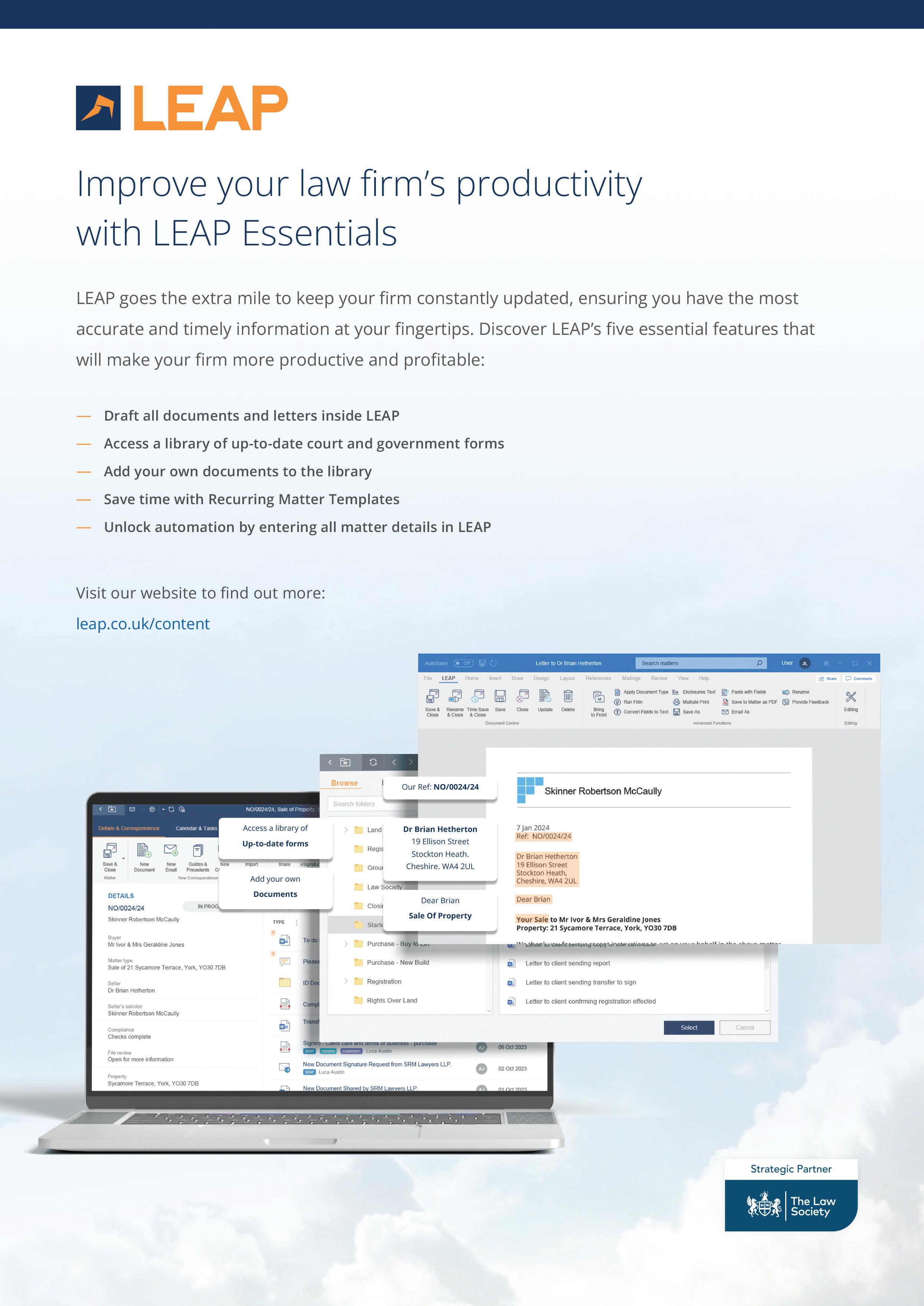






President Kirsty Richards of National Legal Service (Family Lawyer)
Vice President
Massimo Trebar of Lawtons (Criminal Lawyer)
Hon Secretary and Treasurer Judith Gower
Immediate Past President
Diana Kirsch
University of Hertfordshire (Hatfield)
Members
Steve Hamilton
Taylor Walton LLP (Harpenden) Private Client
Marilyn Bell SA Law (St Albans) Family
Paul Davies
Hamilton Davies (Stevenage) Employment, Family and Litigation
Tahir Nisar Whiskers
Michael Scutt Crane & Staples, Employment and Dispute Resolution
Claire Sharp Debenhams Ottaway (St Albans) Private Client
Penny Carey (University of Hertfordshire)
(From January 2024 until 31 December 2024)
Neil Johnson Gisby Harrison Suna Duzgan National Legal Service
Alexander McDowall Hertfordshire County Council
Nicola Smyrl of Taylor Walton (Luton and an Employment Lawyer)
Laura Woolard of Taylor Walton (St Albans and a Family Lawyer)
National Council Member
Josephine Duchenne
National Council Member for Hertfordshire and Bedfordshire (from 15th October 2021)
The Law Society
Relationship Manager – East Jack Dunkley
Parliamentary Liaison Officer Judith Gower


As a reminder of my objectives for the year in post as President, they are to (1) increase membership numbers for HLS; (2) raise awareness as to domestic abuse and (3) raise awareness as to the impact of the legal aid cuts for civil family law.
We have had some new firms join with corporate membership but if there are local solicitors that you work with on matters that may be interested in joining HLS, to be part of our supportive community please email our Hon Sec Judith Gower at hertslaw@virginmedia. com
I hope that my posts across our social media platforms is helping our local legal community learn more about the workings of a local law society and to gain insight into how a law firm can benefit from being part of the law society. If you do not already follow me, please find me on LinkedIn (@ kirsty Richards) or on X (@82ladyk) and stay up to date with news and events with Hertfordshire Law Society.
Since stepping into the role of President at HLS, I have attended the following events:
18.1.24, SAALS meeting (Andover)
30.1.24, first HLS council meeting of 2024 (remote)
5.3.24, meeting with 33BR to discuss
webinar series for HLS (St Albans) 11.3.24, Herts LFJB meeting (remote)
21.3.24, Beds, Bucks & Herts ACCA annual dinner (Sopwell House)
11.4.24, Local Law Societies spring luncheon (Malmaison, Birmingham)
16.4.24, 2nd HLS council meeting of 2024 (remote)
Some photographs from those events are on page 6 for those that may have missed the posts on social media.
Reminder of our Awards
Please remember to get those nominations in for our Legal Awards, for which we have the following categories:
• Junior Lawyer of the Year (trainee/ paralegal/NQ solicitors 0-5 years PQE)
• Lawyer of the year (qualified 5 years PQE+)
• Law firm of the year
• Excellence in Diversity and inclusion
• Outstanding contribution in probono services
Don’t forget to get those nominations in as soon as possible, ideally by the end of April 2024 to allow time for collation and judging.
A link to the form is here: https://forms.office.com/Pages/ DesignPageV2.aspx?origin=NeoPortalPag e&subpage=design&id=paJsPophp0GF0V NHE_w-lu2e0-kc2MRKuUly2nivpDNUR DNQNTI1VzhHNjdHN0ZXN1NFS05C TkdIVi4u
Annual Dinner – Friday 7 June 2024
Things are moving along nicely with preparation and sponsorship but if anyone that is reading this article feels they are able to support with a raffle prize please get in touch with me via Kirsty.richards@nationallegalservice.co.uk All proceeds from our raffle ticket sales will go to our chosen charity, Rephael House (counselling service for young
people in Finchley and Hatfield).
On the night there will be music from Time Flies, the close up magician, caricaturist and a photo booth. We will also have a repeat of the game Tops and Tails, as another way to raise funds for the charity of the evening.
Please get your table bookings confirmed to me as soon as possible so that we can confirm your booking and issue your invoices and start the all important table planning; Menu choices will then be released for booking via a separate form.
The link is below to make sure you have your tables secured: https://forms.office.com/Pages/DesignPageV2. aspx?origin=NeoPortalPage&subpage=desig n&id=paJsPophp0GF0VNHE_w-lu2e0-kc2 MRKuUly2nivpDNURFJIVkNRRVQwMll ZSU9DU1daSU9XQzFDRS4u
Webinar series, 33 Bedford Row: As friends of HLS, we are pleased to confirm that the following webinars are being arranged for June 2024 (dates to be confirmed):
• Hammad Baig : VAT Fraud or a synopsis of key provisions surrounding Customs law.
• Alex Adamou : Insolvency Or injunctions? Particularly anti-social behaviour/ housing and interim injunctions?
• Kevin Leigh: Property matters, common problems in conveyancing and neighbour disputes
I will confirm those dates as soon as possible via our HLS website – thank you 33BR.
I hope to see as many of you as possible at the forthcoming awards and dinner and until then, thank you for your support.
Kirsty Richards National Legal Service President, Hertfordshire Law Society



Event at Sopwell House, with the singing waiters!



 Local Law Societies Luncheon
SAALS Meeting – Andover
Our first HLS meeting of 2024
Local Law Societies Luncheon
SAALS Meeting – Andover
Our first HLS meeting of 2024


The Merthyr Tydfil case has been widely reported as mandating parties, or potential parties, to litigation to first engage in ADR but does the judgment itself support this conclusion?
Mr Churchill purchased a property within the Council’s area in 2015. The Council owned adjoining land which was tainted with Japanese Knotweed, a highly invasive destructive plant. Mr Churchill claimed that, since 2016, the knotweed had encroached on his land causing a loss in value and enjoyment. When Mr Churchill raised a complaint with the Council he was advised to utilise its complaint’s policy and warned, should he proceed to litigation without doing so, the Council would apply to stay proceedings pending completion of its complaints process.
Mr Churchill filed his claim without utilising the complaints policy, the Council applied for a stay.
In the County Court the judge found that he was bound by the decision in Halsey v. Milton Keynes General NHS Trust [2004] EWCA Civ 576 Halsey was understood as authority for the position that parties to a dispute could not be required by the court to
engage in ADR. The judge refused the application accordingly.
The Council appealed and the case was referred directly to the Court of appeal as it was considered a matter of wider importance.
The court of appeal, Sir Geoffrey Vos MR giving lead judgment, allowed the appeal in part but refused to order a stay as the circumstances of the case at the time of the hearing had changed to such an extent it was not appropriate.
The Court decided:
1 Halsey was not authority for a court being unable to stay proceedings for ADR or force parties to pursue ADR;
2. The court has the power to stay proceedings and/or order parties to engage in ADR, this is not in breach of a party’s right to a fair hearing; and
3. The court declined to set any criteria for when the court should exercise this power but accepted that the characteristic of the ADR procedure being considered would be relevant, particularly the “merits and demerits” of each process being considered.
The Court noted “The court should only stay proceedings for, or order, the parties to engage in a non-court-based dispute resolution process provided that the order made does not impair the very essence of the claimant’s right to proceed to a judicial hearing, and is proportionate to achieving the legitimate aim of
settling the dispute fairly, quickly and at reasonable cost.”
While the court has the power to order a stay for parties to engage in ADR, or to order parties to engage in ADR, whether that power is exercised is down to the specific facts of the case and the method of ADR being considered. This case does not, despite headlines, make ADR mandatory.
Of note for Local Authorities is Sir Geoffrey Vos ’ comments regarding a Local Authority’s internal complaints procedure at paragraph 71, particularly: “Fourthly, the procedure itself seems, predominantly at least, to envisage a complaint about the Council’s services to council tax payers as opposed to private law claims against the Council as a neighbour. Finally, whilst the Council submits that its internal complaints procedure is crucial, because the total value of all knotweed claims brought by adjoining owners against the Council is very high indeed, it may not be the most appropriate process for an entrenched dispute of this kind.”
As such it is likely that any attempt to compel a potential claimant to engage in the internal dispute process will be resisted.
Brenden Delaney Litigation Lawyer, Herts County Council Legal Services


On 24th April I had the pleasure of attending the inaugural FLANC (Family Law Advice for the Neurodivergent Community) conference, titled “Promoting Access to Justice for Neurodivergent Children and Adults in the Family Justice System”.
As the keynote speaker, Sir Andrew McFarlane, President of the Family Division, pointed out, the fact that the event was so well attended would seem to indicate that the work this organisation is doing is much needed; and makes you wonder why no one has done it sooner!
The range of speakers was varied and useful. As ever, the voices of the Family Justice Young Peoples Board were inspiring and so powerful. Hearing from the young people affected by the family justice system is always such a useful reminder of who should always be at the centre of our work. It was also useful to hear from experts both in terms of supporting neurodivergent children, who may be the subject of proceedings, and neurodivergent adults, who are likely to be the parents/carers. Also hearing from those involved in the family justice system, but who are also parents of autistic children themselves (like myself), and who really understand the constant daily battles faced by neurodivergent people was very moving and explained where a lot of the passion and drive in this organisation comes from.
The advice and suggestions I took away from the conference are too numerous to name here, but what I would encourage you to do is to take a look at the FLANC website - https://flanc.org.uk/ which has many resources available. In particular, I would recommend taking a look at the four excellent guides to autism by Professor Rob George (who spoke at the conference) and Professor Anna Remington of UCL for a very simple and easy to understand starting point of things we can all do to make life easier for our neurodivergent clients. The guides are for judges in the family court, for family lawyers, for court staff and for reception staff and chambers clerks.
The main take away from the conference for me (apart from the very lovely notebook!), was that a lot of the accommodations that are suggested are simple, but can make a huge difference to people who are neurodivergent, and actually, are things we should be doing anyway, for neurodivergent and neurotypical people alike. Lawyers are renowned for using overly complicated language and being forced to think about what we say and how we say it can only benefit everyone we deal with!
One of the other suggestions FLANC makes is the use of All
About Me and Behaviour Documents, so that when working with neurodivergent people it is easy to see at a glance what works best for them. A barrister at the conference commented to me that one of these being sent with every brief (whether for a neurodivergent client or not) would actually be extremely useful – it’s certainly a small idea that could make a bid difference and something I will be putting into practice myself.
I really believe that times are changing and the need to be far more aware and understanding of neurodiversity is gaining importance for businesses and organisations all the time. The huge number of neurodivergent adults and children involved in the family justice system means that we as family lawyers must be at the forefront of this change, and FLANC is an invaluable resource to help us do this.
Sara Sanderson National Legal Services
http://www.hertslawsoc.org.uk/
 Antony Starnes
Antony Starnes
In this article, we’ll delve into the concept of parental responsibility, examining when and how it can be terminated with reference to reported cases.
What is Parental Responsibility (“PR”)?
Section 3(1) of the Children Act 1989 defines parental responsibility as “all the rights, duties, powers, responsibilities and authority which by law a parent of a child has in relation to the child and his property".
Those with PR can make important life decisions such as education and medical treatment.
Who has Parent Responsibility?
Mothers who give birth to their children automatically have parental responsibility. A couple who are married or in a civil partnership at the time of birth both have automatic parental responsibility as does an unmarried father who is named in the child’s birth certificate.
PR can also be granted to those who hold a “lives with” Child Arrangements Order or a Special Guardianship Order.
For the purpose of this article we focus on the parents. A married parent with PR will not lose parental responsibility upon divorce or dissolution of the civil partnership.
Ways in which Parental Responsibility can come to an end
There are two ways in which parental responsibility can usually come to an end.
1. The first being that the child reaches the age of maturity. In the UK, the age of maturity is eighteen. Once a child reaches the age of maturity it is generally considered that the child will have the capacity to make their own decisions.
2. The second way in which parental responsibility can come to an end is by an order of the court terminating it
Parental responsibility can be terminated by the court and this can happen for example in the following ways:
a. Making of an adoption order - when a court makes an adoption order, this order will sever the legal ties between the birth parents and the child(ren) and parental responsibility will transfer to the adopters.
b. Discharging an order that confers PR - orders such as a child arrangements order for the child to live with a designated person will confer parental responsibility on the parent/carer for as long as the order lasts. If at a later date the child arrangements order is discharged then the parental responsibility will cease.
c. The Court orders the termination of the PR of a Parent
It is worth noting that PR can also be limited by the court for example by a Prohibited Steps Order, but that will not be explored in detail here as the focus is on termination of PR.
Court ordered termination of parental responsibility
It is possible to make an application to ask the court to terminate PR where there are compelling reasons to do so. Section 4(2A) of the Children Act provides that a person who has acquired PR shall cease to have that responsibility if the court so orders.
The court exercises its discretion based on
the specific facts and context of each case. Factors such as the child’s welfare, parental behaviour, and any risks involved are key matters to explore.
Reported cases in which Parental Responsibility has been successfully terminated
The removal of PR is an incredibly serious measure. Since the inception of the Children Act 1989 there have only been a handful of reported cases where PR has been successfully terminated, I should however say that these are just the reported ones.
We know there are more unreported cases in which this occurs from local solicitors who handle such cases including former 2018 President Tia Hussain who secured the termination of a dangerous Father’s PR.
The following cases demonstrate circumstances in which applications for the termination of PR have been successful:
a. The mother made a successful application to terminate the father’s parental responsibility in Re P (Terminating Parental Responsibility) [1994]. The test which has since been applied in future cases is in summary; would the court grant parental responsibility based on the facts now, if parental responsibility did not already exist? As with any children matters the “welfare checklist” is applied and forms the basis as to whether the termination of parental responsibility was in the best interest of the child.
b. In CW v SG [2013] the child was the only biological son of both the mother and the father. The mother had two daughters from a previous relationship. The child’s father pleaded guilty to sexually abusing his step daughter’s. During his time in prison, the father wrote to say he wanted contact with the child. Upon his release from prison, the mother made an application to terminate his parental responsibility.
The court held it was inconceivable that if the father made an application for parental responsibility at that time, it would be granted. Owing to the impact of the father’s abuse of his step daughter’s, on the family, the father could not foreseeably exercise parental responsibility in a way which was beneficial for the child. The court therefore ordered the terminated of his parental responsibility.
c. M v F (change of surname: terminating Parental Responsibility) [2016].
The father was accused and convicted of seriously sexually abusing his child and received a 14 year custodial sentence. Following this conviction the mother made applications seeking to terminate the father’s parental responsibility for both of their children and an order seeking to change the children’s surnames.
The court found that the application was entirely appropriate and child focused. The compelling factors were the significant harm the child had suffered at the hands of her father, both the children’s emotional needs and the risk of future harm to both children if the father exercised parental responsibility to be involved in their lives.
d. In the matter of D v E [2021] the mother made the following applications to court:
i. A Child Arrangements Order for no contact between the child and the father; ii. A Specific Issue Order to change the child’s surname; and iii. An order to terminate the father’s parental responsibility.
The facts of the case were that the father had engaged in a course of harassment against the mother after their separation. The mother also alleged domestic violence and coercive and controlling behaviour during their relationship. Separately, the father was accused and convicted of grooming and threatening a 14 year old girl amongst other offences.
The court held that the father posed a significant risk to adolescent children and that if he continued to hold parental responsibility, the father would likely use it
to control and harass the mother. The court was satisfied that terminating the father’s parental responsibility was manifestly in the child’s best interests.
Parliamentary Debate – Parents who commit murder
On 26 August 2021, Jade Ward was murdered by her estranged husband in a premeditated attack following their separation. The husband was said to have been controlling and coercive throughout their relationship. Jade had four children with her husband, who had parental responsibility for all four, and those children were placed in the care of the maternal grandparents.
On 12 April 2022, Jade’s husband was sentenced to life imprisonment with a minimum term of 25 years in prison.
The maternal grandmother was completely dismayed when she was informed by the social worker that her own daughter’s killer will retain parental responsibility for all the children despite this heinous crime he committed against the family.
This meant that the father could still make applications in the family court to spend time with the children. This also meant for example that if the grandparents wish to take their grandchildren on holiday the permission from the father must be sought and the father could continue to have a say in the important life decisions of the children and worse yet, could still potentially challenge any decisions made by the grandparents.
On Monday 7 November 2022 the matter was debated by the members of parliament led by Rob Roberts MP
In his opening speech Rob Roberts MP highlighted the pain that Jade’s family must be going through and will continue to go through as Jade’s husband retained his parental responsibility unless a court orders his parental responsibility is ended.
Rob Roberts MP further stated that the current process effectively compels the family to remain in contact with the father throughout the children’s lives until the last child reaches eighteen years old. He went on to say that as it stands this process
effectively grants the convicted parent the means to continue the control and coercion of the family in the way they did prior to the murder of the victim.
Rob Roberts MP called for a change in the law to make applications to remove parental responsibility of a convicted parent in such cases easier.
On 3 October 2023 the Justice Secretary, Alex Chalk KC, stated that there will be a new law aimed at protecting children from harm.
The Justice Secretary confirmed that the Victims and Prisoners Bill will be amended.
The Bill will now include a section that any parent who kills a partner or an ex-partner with whom they have children with will automatically have their parental responsibility suspended upon sentencing.
This new rule will apply to a parent that is convicted of the murder or voluntary manslaughter of a person they share parental responsibility with. This will supposedly abolish the need for the family to apply for an order to restrict or terminate the parental responsibility through the family court and instead the decision will be examined at the sentencing hearing to ensure it is in the best interests of the child.
We understand that there will, however, be an automatic exemption in cases of serious domestic abuse where the domestic abuse victim kills their abuser.
A link to the Ministry of Justice article can be found here: https://www.gov.uk/government/news/jadeslaw-to-be-introduced-to-better-protect-children
Jade’s Law to be introduced to better protect children - GOV.UK (www.gov.uk)
Any application for termination of PR will, as with most cases, need to be considered on the facts and information available and I hope this exploration is a helpful guidance for family practitioners considering the issue.
Antony Starnes Paralegal Luton Care Team, National Legal Service
http://www.hertslawsoc.org.uk/

There has been a lot of media coverage concerning the case of Williams v Williams [2024] EWHC 733 (Fam). This case has caused much debate between lawyers about whether the Judge and President of the Family Division, Andrew McFarlane, reached a fair decision in not allowing a Final Order of Divorce to be set aside.
The circumstances of the case are as follows: The wife was represented by Vardags and her solicitors had issued divorce proceedings on her behalf. The Conditional Order of Divorce was made by the Court (the first formal stage of divorce proceedings) sometime earlier and on 3 October 2023 the wife’s solicitor applied for a Final Order of Divorce, in error. The wife’s solicitor had intended to apply for the Final Order of Divorce in respect of another case.
The solicitor had applied for the Final Order of Divorce using the Court’s online portal, which is the platform used for all divorce cases issued after 13 September 2021. It was set up to streamline the divorce process but arguably the portal makes it far easier for mistakes such as these to occur. Prior to the introduction of the Court portal, divorces applications were submitted by way of paper application and therefore mistakes such as these would have been much less likely to occur.
A family law solicitor may have a number of different divorce proceedings which are live on their online portal at any one time and in order to move a case forward they will be required to select a particular case. In this instance, it appears that the solicitor in question essentially clicked on the wrong case on their online portal and proceeded to apply for the Final Order of Divorce in the wrong matter. Applying for a Final Order of Divorce before a financial settlement is reached can have very serious consequences if one party dies before a financial order is made by the Court, especially in relation to pension issues.
After realising the mistake, the wife’s solicitor applied to the Court asking the Court to rescind the Final Order of Divorce and in the first instance the Judge agreed such that the Final Order of Divorce was rescinded, however no notice of the Final Order being rescinded was given to the husband. The husband appealed the decision for the Final Order to be set aside and on appeal, the Judge ordered that the Final Order of Divorce should stand and should not be set aside.
Why has the case attracted so much attention?
The case has highlighted that a simple error, such as the one made by the wife’s solicitor in this case, could have a very detrimental impact on the wife’s position, financially.
Where a Final Order of Divorce is made before financial matters have been finalised, this can have very serious consequences in the event of the death of either party. For example, in this case, in the event of the death of the husband, because the parties are no longer married, the wife would no longer be entitled to any widow’s pension in relation to the husband’s pension(s).
The Judge allowed the appeal against the Final Order being set aside because, despite the fact the wife’s solicitor did not have specific authority from the wife to apply for the Final Order of Divorce, they were instructed to act and therefore there was no procedural irregularity in making the application for the Final Order of Divorce. The Judge made the point that if he had not allowed the appeal such that the Final Order of Divorce remained set aside, this could set an unwanted precedent potentially allowing any party within such proceedings to argue after the event that an application for a Final Order of Divorce was made in error.
If you are in the process of or considering divorce and have not considered how your matrimonial assets should be divided, it is important that you seek legal advice. Please get in touch today on 01727 845245 or contact anna. patsalides@taylorwalton.co.uk.
Anna Patsalides Associate Solicitor, Taylor Walton LLP

After writing this column for 5 years I thought I might let you know my daily routine. I have to remind my butlers nearly every day!
At 7am I wake them up and like to lie on them until 8am when I demand my breakfast. I am starving by then even if I have had a snack of fresh meat during the night. Whilst they breakfast I like to survey my estate so long as it is not raining. I then wander back in and try to persuade them to go back to bed so I can lie on them. If there is any sun I like to lie on the landing as near as the top of the stairs as possible to try and trip them up. I then sleep until lunchtime when I demand my lunch at 1pm. They only give me half rations so I don’t put on weight.
I spend part of the afternoon outside particularly if they are gardening. If not I will wander back in to either sit in the library with my male butler or the sitting room with my female butler.

At 4pm I demand my tea before sitting down to read a book or catch up on TV. I like to join them when they eat their evening meal. I also need to ensure that there is enough food in my bowl before I go out again.
I try always to get enough beauty sleep so demand they go to bed at 10pm. Frequently they stay up later – what is the world coming to! I start the night lying on my male butler but when he goes to sleep I have to change to my female butler.
Depending on the weather and how I feel I spend some or a lot of the night outside preferably hunting. However as you know they do not appreciate my offerings.
There are two photos of me lying on the landing; which is my best side do you think?
Gigi @princessgigi2019


The most common question I get asked during probate by beneficiaries is about understanding timescales. It is important to manage expectations in a professional and efficient way, while at the same time being compassionate and empathetic as we are always working with clients suffering through grief.
Our goal is for our clients to remember the individual who has passed away and not be burdened with the administration element of probate. Ultimately, the issue of probate also means we are able to distribute assets or assist in selling properties within the estate, which helps families gain closure and move on.
Our probate team of four solicitors plus seven legal secretaries is one of our largest departments. We have a substantial Will bank where much of our probate work originates from. However, we also work with beneficiaries and executors both locally and across the UK who approach us directly.
An initial meeting is a time to talk about the process of probate and what to expect, then we inform beneficiaries with meaningful updates when milestones are reached. We pride ourselves on our excellent client care and to achieve this we must first identify all the assets within an estate. Therefore, early in the probate process we conduct a full Financial Profile Search through Estatesearch. Even if executors don’t believe there are assets the family is unaware of, we suggest an asset search as a best practice approach.

Previously, we might have had a steer from the family, then proactively written to each of the relevant financial institutions to establish what assets were held by the deceased. However, this was time consuming and even in the best case, a family can never be entirely sure what assets are held. It’s easy to forget an old pension pot or shares or these days, not to be aware of online accounts.
Estatesearch’s Financial Profile search includes AML and Identity Trace, Liability Search and Financial Asset Search. In the Financial Profile Premium, it also includes Company Directorships and an Unclaimed Asset Search that includes up to 40 additional pension and insurance providers to help locate forgotten accounts, policies, and shareholdings within 30 days.
Estatesearch Financial Profile Search is a cost effective and efficient option which offers peace of mind that nothing has been overlooked.
Several clients have been surprised and pleased when the search has discovered unknown accounts. These have all contained relatively small amounts of money which have not impacted the IHT position. However the searches demonstrate the importance of due diligence for us as a firm, as unravelling the situation in relation to IHT if a substantial asset was discovered at a later date, would be highly complex.
We also use Estatesearch to place statutory
notices, to undertake share valuations and for ID and bankruptcy checks. We use Estatesearch’s free, secure online portal which means searches are seamless, easy and quick to order reducing the overall time spent and therefore, cost for the estate.
We have even recently used Estatesearch’s Will Search in a difficult situation where one executor questioned the validity of an existing Will. Without Estatesearch’s Will Search options would have been very limited to check if any later versions of the Will had been made. It meant we could remain professional and objective throughout a challenging matter.
We want to ensure that everyone is given the same level of excellent service and treatment and that we can guide and support clients through probate as professionally as possible. Being able to work with Estatesearch is valuable, as a comprehensive asset search in addition to the add on searches speed up processes and ensure we can offer an efficient and seamless service for the benefit of our clients, making what is always a difficult time, a little easier.
James O’Toole, Solicitor, John Fowlers SolicitorsFor further information about John Fowlers please see: https://www. johnfowlers.co.uk/
For further information about Estatesearch please see: www.estatesearch.co.uk

New research shows 42% of people on low incomes had no legal assistance or representation in court compared to only 19% on higher incomes. Alarmingly, eight out of 10 believe that people with less money get a worse outcome in the civil justice system (83%).*
The Law Society published the interim report of the 21st Century Justice Project that details plans to narrow the justice gap for small businesses and individuals on low incomes who are unable to afford a solicitor or are not eligible for legal aid:
These plans in seven key areas of civil law include:
1. Call for a publicly funded online information and guidance tool to help identify the legal issue and direct users to appropriate dispute resolution.
2. Explore how international models of delivering civil legal aid could work in England and Wales, and how healthcare professionals can refer people with a legal need.
3. Convene a cross-industry working group to make insurance that covers legal expenses work better for existing policy holders.
4. Provide support and guidance to members offering unbundled or fixed-fee legal services and explore ways to reduce risk and expand insurance cover for AI-generated legal services.
5. Promote reform of the ombudsman sector as a key part of dispute resolution, which should sit within the Ministry of Justice.
6. Improve support for small businesses to resolve disputes by strengthening the role of the Small Business Commissioner.
7. Work with stakeholders to explore ways to protect consumers from the risks of using AI-generated legal services.
According to the recent Legal Needs Survey, more than half (54%) looked online for information to manage their legal issue, up 4% since 2019.
Yet, overall, one in two think that they will not be using AI technology because they lack trust in it (51%) or because there is no human oversight (49%)*.
President of the Law Society of England and Wales, Nick Emmerson said: “Everyone deserves a fair, timely solution to their legal problems, and we know small businesses and people on low incomes can struggle to get the support they need.
“Access to justice is a fundamental right that should not be contingent on a person's background or financial means. Our 21st Century Justice Project is leading the charge, identifying actionable simple ways to future-proof our justice system.
“Civil justice is not only vital for upholding the rule of law but also for
maintaining a robust economy and ensuring a just society.
“With an impending general election, it is imperative for the new government to consider how to narrow the justice gap and create a fairer, more accessible system for all.”
Richard Atkinson, vice president of the Law Society and chair of the 21st Century Advisory Group commented: “Since we launched the Green Paper of our 21st Century Justice Project last year, we have worked hard to consider the feedback we received through our consultation and undertake additional research and engagement.
“This interim report represents a new iteration of our proposals and the work we plan to do alongside others to realise our vision of a 21st century justice system. I am looking forward to working with our members, stakeholders and our Advisory Group to drive the project forward and help our members adapt and evolve to changing trends.”
* YouGov, Legal Services Board, Law Society: “Find out what your clients need, with the results of our Legal Needs Survey." Note: People on low income earn £32,000 or less and people on high income earn £60,000 or more.



We all know that being active is important for our physical and mental health. However, I am going to look beyond the obvious benefits of being active and take a deeper dive into the field of neuroscience, which demonstrates the interconnectedness of our mind and body when it comes to our mental health. Developing awareness of the way we move and understanding our body’s signals can help us regulate our emotional and physical states, particularly during times of stress.
Neuroscience research shows how our nervous system plays a crucial role in how we experience and respond to stress, anxiety and other difficulties in our brains and bodies. Each day we ebb and flow between the states of our nervous system that either activate or calm us.
Whilst fluctuations in our mood and
energy are normal as we respond to daily challenges if we spend too long at the extreme end of either state it can negatively impact our physical and mental health. There is a healthy range around the middle of this spectrum, called ‘the window of tolerance’. Within this range we can cope with the challenges of life without completely withdrawing or feeling overwhelmed. When we find ourselves out of balance, one of the ways to return to and broaden our window of tolerance is through awareness and the intentional use of movement.
Awareness as our starting point
Find a comfortable sitting position and then close your eyes. Scan your body to track what sensations you notice. This might be an unfamiliar or uncomfortable activity but give it a go. Can you feel the beating of your heart, tension in your muscles, the clenching of your stomach?

Maybe you sense something else? Perhaps you are not detecting anything at all. Welcome to “interoception” – your brain’s perception of your body’s state, transmitted from receptors in our internal organs. Interoception can be strengthened by physical activity as it shifts our focus away from our thoughts and into the present moment. Our sensitivity to interoceptive signals can make us more aware of how our thoughts and feelings are affected and help us connect our general state with what’s going on in our life.
Why it’s not that easy
Although the benefits of being active and moving with awareness are clear that doesn’t mean it’s always easy to do. There can be health limitations, competing priorities and various other challenges. Externally - prioritising family and work commitments. Internally – traits of perfectionism, workaholism and negative beliefs such as feeling not good enough. These patterns can keep our nervous system activated and perpetuate cycles of stress and pressure, which can mean we are unaware of our bodies and how we move them. We can lose the motivation to focus on ourselves and it can feel frustrating to be reminded of the importance of movement. It might seem insignificant in the context of the challenges and difficulties in our lives. Noticing how little we prioritise ourselves and taking stock of our belief systems (that might judge us as selfish or indulgent to be focusing on ourselves), is an important part of the process.
Tips for moving with awareness
Our relationship with our bodies and our overall health is a lifelong journey, but to see change and really get the benefits, it’s important to have a few strategies to experiment with.
1. Get to know your existing relationship with movement and your body – what works and feels good; what keeps you stuck in your chair.
2. Create a new movement habit that works for you and which you enjoy - the simple act of practising any behaviour every day helps it become a larger habit.
3. Start small – try small movements such as changing posture and observe any difference. If you find yourself hunched over your laptop during a busy day and are tempted to reach for your smart phone to distract you instead try:
• gentle neck stretches from left to right and lowering your chin to your chest.
• lengthening your spine and gently twist the torso to each side, sitting upright.
• putting your hands on your hips and breathe in deeply and then sigh out. Repeat.
4. When your stress response is switched on: you might be holding your breath, feeling tension in your muscles, restlessness, fear - try any activity that gets you out of your head and into your body: strength training, vigorous
exercise, or yoga. Physical activity can reduce the level of stress hormones that are activated, and it boosts chemicals such as dopamine and serotonin which can improve mood as well as brain functions like memory and cognition.
5. If you notice that your energy has dropped: you might feel lethargic, disconnected, depressed, foggy brained or numb. These are signs to activate the energy in your body. Try any physical activity that increases your heart rate and gets your body moving; stretching, changing posture or walking.
Can you take time to pay attention to what your body is communicating to you? Notice shifts in your internal state by listening to your body with intention, attention and using the action of movement. If you find you don’t have time for that…. that might be the first thing to pay attention to.
Claire Jacques is a former lawyer who has retrained as a UKCP registered
psychotherapist, group facilitator and trainer with Lawsight Ltd. (www.lawsight. co.uk) Claire is also a supporter and Champion for LawCare.
The legal sector is known for its high stress, long hours, and sedentary nature. During Mental Health Awareness Week (13 to 19 May) LawCare, the mental health charity for the legal sector, are encouraging us all to move more for our mental health. Find out more by visiting the LawCare website (www.lawcare.org.uk) and following LawCare on social media.
LawCare also offers a safe and confidential space to talk, without judgment, whether you’re just having a bad day, or you are facing something longer lasting. If you need support, call LawCare on 0800 279 6888, email support@lawcare.org.uk, or visit www.lawcare.org.uk to use the live online chat.
Claire Jacques Lawsight Ltd

http://www.hertslawsoc.org.uk/
LEAP, the legal practice management productivity solution announces the launch of its partnership with LawY, a newly integrated AI legal assistant which is exclusively available to users of LEAP. LawY generates fast, accurate responses to legal questions posed by practitioners.
While generative AI can be extremely intelligent, precision and accuracy are paramount in legal matters. LawY uses AI to answer legal questions from an expanding legal knowledge base, that grows, improves and learns with each verified response. LawY employs a pool of experienced and qualified lawyers who act as verifiers eliminating any risk of error or misinformation. Differing from other AI tools the results produced within LawY include case law and references to support any findings.
“LawY not only reduces the research burden on practitioners, but also ensures that information produced is accurate and reliable and aligns with the rigorous standards upheld by legal practitioners.”
Gareth Walker, CEO, LEAP UK says:
“With LawY, LEAP users get instant answers to their legal questions with the added benefit of having the responses endorsed by genuine
legal expertise. It is a powerful productivity tool that hastens legal administration, enabling those firms using our software more time to focus on delivering a top-tier service to their clients.”
Gareth continues, “In the last year LEAP has invested time and money into developing AI functionality within the software, and the LawY integration is just the beginning of a list of exciting new AI features being made available over the coming months.”
"Boosting LEAP's AI capabilities helps users streamline legal tasks, especially useful for those on fixed fees. This investment frees up a lawyer’s time to focus on building strong client connections, offering better expertise to more clients, and ultimately, making more money."
This unique integration enables legal practitioners to deliver faster, more accurate responses and reduces administration efforts, aiding everyday tasks including:
• Conducting legal research
• Drafting letters and documents
• Creating precedent orders
• Preparing court documents
• Reviewing case law or legislation
• Drafting affidavits
• Proof reading
• Grammar checking
• Summarising information
LawY is available as an integrated module to the LEAP user base immediately.
For more information, please visit: https:// www.leap.co.uk/integrations/lawy/
About LEAP
LEAP Legal Software has been helping law firms to become more efficient and profitable globally for more than 25 years. LEAP is committed to consistently providing world-class legal practice productivity solutions and has innovation at the heart of its research and development so that users continually have the best possible experience.
Occupying a unique position in the legal software market, LEAP includes legal case management, legal accounting, document assembly, document management and legal publishing assets in one solution. Its software is designed to streamline tasks such as matter management, time recording document management, email management, automated forms, client accounting, billing, reporting and remote working.
For more information, please visit www. leap.co.uk/lawy/


Yesterday (12th March 2024), charity sector representatives delivered evidence in Parliament to demonstrate the significant impact of probate delays on charities in an official hearing session that forms part of the Justice Committee’s Probate Inquiry.
Submitting evidence to the cross-party committee of MPs, the three panellists highlighted how delays at probate affect both beneficiaries and charities, particularly those that are reliant on funding from gifts in Wills. Sector representatives included:



2) Angela Morrison, Chief Operating Officer, Cancer Research UK
3) Dave Hawes, Director of Finance & Infrastructure, Devon Air Ambulance Trust and a Board member of the Institute of Legacy Management (ILM).
During the session, sector representatives welcomed recent improvements in probate output and opportunities to collaborate with HM Courts and Tribunals Service (HMCTS), suggesting improvements for long term change, which include:
• Appropriate resourcing for HM Courts and Tribunals Service (HMCTS), enabling probate teams to upscale their services and meet rising demand as death rates climb, reflecting too on the growth of charitable gifts in Wills.
• More publicly available data on the scale and scope of the backlog and ongoing workflow, including ‘stopped’ estates, to ensure that charities have the information needed to inform their forecasting.
• Continued collaboration with the charity sector to ensure that any changes or proposed improvements reflect charities’ needs and have no unintended consequences on charities.
While the focus of the hearing was on charities and how their services, forecasting ability and wider finances are impacted by the probate system, the panellists reflected too on the profound impact on grieving families, many of which turn to charities for support.
Speaking after the event, Alex McDowell, Vice Chair of Remember A Charity and Director of Fundraising at the Duke of Edinburgh’s Award, said: “Charities are increasingly reliant on income from gifts in Wills, and any delays or problems at probate can have a significant impact


not only on funding for vital charitable services and beneficiaries, but on charities’ ability to forecast their income and budget for the future.
“We’ve seen probate output levels improve significantly in recent months and that’s the chink of light that charities have been waiting for to enable them to shore up their support for beneficiaries at a time when demand for charitable services has never been higher. And now, for charities to be able to continue delivering such critical services, it is vital that the Probate Registry is equipped and resourced to manage the increasing number of cases at probate, without compromising on quality.”
Dave Hawes, Director of Finance & Infrastructure, Devon Air Ambulance Trust and a Board member of the Institute of Legacy Management (ILM, said: “This was a welcome opportunity to explain why and how probate delays have impacted charities of all sizes right across the sector, which I’ve seen both as a director of Devon Air Ambulance and as a Board member of ILM."
“The probate service is crucial to ensure that people’s last wishes are followed and it’s important that HMCTS is able to support this in a timely manner both now and into the future.”
Remember A Charity and the Institute of Legacy Management have been working closely with HMCTS as part of the Probate Service Users Working Group, ensuring the impact of delays on charities is represented in key discussions and factored into ongoing service developments.
McDowell added: “HMCTS has already committed to several steps to improve the probate ecosystem for charities, which includes provision of more information on cases in the system and an indicator to identify charitable estates in the system. We are grateful to the team for their continued support and recognition of just how crucial the probate service is for charities.”
Gifts in Wills currently raise around £4 billion* for good causes annually, funding vital charitable services for charities and community-based organisations across the country.
*Legacy Foresight, 2023
Background to the Probate Inquiry
The Committee launched the Probate Inquiry in November 2023 amid reports the Probate Registry has been experiencing significant delays. The Inquiry is taking evidence on capacity, resources and delays across the probate service and the impact of digitisation and centralisation, including the effectiveness of the online probate portal. It is looking at people’s experiences of applying for probate including how the administration of probate could be improved.




Stateline Transport Limited (‘Stateline’) had been operating a commercial freight storage operation in Dublin, without planning permission, on land leased from Tesco Ireland Limited (‘Tesco’). After the Fingal County Council commenced enforcement action, Tesco applied to the High Court of Ireland for an injunction requiring Stateline to cease its operations. The parties settled before the hearing, with Stateline agreeing to an order requiring it to cease the unauthorised use.
Stateline then applied, with Tesco’s consent, for a 12 month stay of the order, based on the public interest in their operations continuing, before subsequently appealing to the Court of Appeal of Ireland.
The expert evidence In applying for the stay, Stateline relied on the evidence of four experts, including an economic expert, Dr Gurdgiev. The trial judge also directed that an affidavit be sworn exhibiting the briefing note provided to Dr Gurdgiev. The affidavit identified two errors in the briefing note.
Dr Gurdgiev’s report assessed the impact on the container storage capacity in the Dublin area if Stateline were required to cease its operations, concluding that it would increase costs for Irish importers and exporters, raising prices for end-users and export customers. The report relied on statistics published on the website of the Dublin Port Company which were accessible via a hyperlink in the report.
The trial judge noted that there were a number of discrepancies between the report, on the one hand, and the
briefing note and the information on the Dublin Port Company’s website, on the other. Most significant was the omission from the report of any reference to proposed additional storage capacity to be provided by the Dublin Port Company. This omission undermined the confidence which the court could place in the report. The trial judge also noted that on certain critical matters the report relied uncritically on information provided by Stateline.
The Court of Appeal
One of Stateline’s arguments on appeal regarded the weight which should have been attached to the uncontradicted expert testimony it had adduced.
The judge noted that the trial judge had had no concerns about the credibility of Dr Gurdgiev, who was a highly respected and well qualified economist. He had been asked to produce his report in five days and clearly did not purport to have done independent research to confirm the underlying facts upon which he had been instructed.
The concerns that the trial judge found with Dr Gurdgiev’s evidence went to the weight of the evidence rather than its admissibility. That said, the court was not required to accept evidence because it was uncontradicted. It was also not strictly correct to characterise this as unopposed evidence, because Stateline knew that Tesco had consented to the application, in a commercial agreement, and would not oppose it.
With respect to the hyperlinks within Dr Gurdgiev’s report, the judge noted that “I do not accept the criticism that the trial judge
engaged in independent research rather than addressing his concerns to the appellant. If material is hyper-linked in an expert’s report, then it constitutes part of the reference material upon which the report is based and a court is, at very least, entitled (if not expected) to look at it where it has concerns regarding the content of the report itself. This is not ‘independent research’ but rather an attempt to understand an expert report in its own terms.”
Learning points
Learning points for experts are:
• When you finalise your report, make sure that any hyperlinks you have included are up to date and still relevant.
• As with any references, your report should be consistent with the information in the hyperlinked material. The judge may decide to follow any hyperlinks and review the linked material.
• You should include any key information you have relied on in the report itself. This is especially true if the information is set out on a website or in a document that is regularly updated. Litigation can be a lengthy process, during which time online materials might be altered, sometimes without acknowledgement.
• It can sometimes be useful to maintain your own library of key materials published online that are regularly updated, such as guidance or datasets.
• You should always carefully read the instructions and other material provided by the solicitor. However, do not simply rely on facts and data included in the instructions – it’s always best to verify with the source evidence.



As all Deputies and Court of Protection specialists will know, applying for a Statutory Will can be a complicated and time consuming matter. As part of the duty of care, and requirements for making a Statutory Will, it is necessary to hold a copy of the person’s existing Will, a draft of the proposed Will, details of their family, assets and income, as well as medical evidence of their incapacity in order to provide these to the court, together with any other evidence the court requires.
Anyone who would be potentially affected by the application (perhaps a beneficiary who would lose out, for example) will be a party to the court proceedings. Finders International specialises in researching P's next of kin, providing a verified family tree and a full report of the required findings to support your Application to Court.
Here are some of the ways in which a probate genealogist can help:
1. Verifying Family Tree Information:
We can conduct thorough research to trace and identify all of P’s next of kin according to intestacy rules. We can do so with little or no contact with the family, at the authority of the Deputy, and ensure that our research is backed by documentary evidence.
The court or the deputy may receive information about P’s family from various sources, including family members. This information can often be inaccurate; therefore, we can verify the accuracy of any information already held, ensuring that the family tree is comprehensive and reliable.
2. Resolving Complex Family Scenarios:
In cases where the family structure is complex or unconventional, a probate genealogist can provide expertise in unravelling intricate family scenarios. This includes stepsiblings, half-siblings, or other unique family relationships. With modern families spread across the globe our international expertise can assist in even the most complicated of family make ups, and wherever people may live.
3. Ensuring you are aware of P’s existing Will & financial assets
Ensuring you know of any Will P may have made in the past is crucial to this process. Finders can assist by conducting a comprehensive Will Search to identify any Will that may have been made before P’s affairs were managed under Deputyship Order. Additionally, a full missing asset search can also be conducted for P, ensuring that you are aware of the full financial picture.
4. Providing Evidence for the Court:
The findings of a probate genealogist can be presented as evidence to the Court of Protection. This documentation helps validate the accuracy of the family tree and ensures the correct family members are notified of the process.
Insights into the research process
A question that we are often asked is, ‘How do you do it?’ Many
who have researched their own family tree will know that birth, marriage, and death records are essential in confirming findings. At Finders International, we also have in-house databases, local representatives, and a network of international researchers to assist with our research. Each case comes with its challenges, including children born out of wedlock, overseas research and common surnames. Our team work on cases with these elements on a daily basis and carry out research for Court of Protection teams all over the country, so have the experience to overcome these research hurdles.
At the point of our instruction, the only information held was that P had a deceased partner and one living cousin.
Our research first confirmed that P had no children and was an only child.
Extensive research using all available genealogical resources confirmed that P had no living Paternal family. However, we confirmed that P’s maternal family was larger than expected.
During the course of our research, we identified 6 maternal aunts and uncles who left descendants, identifying a number of living cousins.
As part of our verification process, we obtained birth, marriage and death certificates and identified current addresses for all P’s next of kin. This information was provided to the Deputy in an easily digestible family tree and report, with appropriate supporting documentation. In this case, at the Deputy’s request, no contact was made with the family before our report was submitted.
Our involvement in this case was key, as we identified three more family members in addition to the cousin previously known. This full picture enabled the Deputy to proceed with the Statutory Will Application and notify all the correct next of kin.
Our expertise in genealogical research ensures a thorough and accurate representation of the P’s family connections, enabling confidence in the information provided to the Court for the purposes of obtaining a Statutory Will.
Finders International can assist pre-deputyship application if the court requires you to contact family, friends or neighbours of P. We can also assist with Statutory Will Application research, Missing Will and Assets searches, Administrator searches and Unoccupied Property Insurance. If you have a case like the above or have any questions regarding our services, contact us today at quotes@findersinternational.co.uk, call 0800 085 8796 or visit our website www.findersinternational.co.uk

